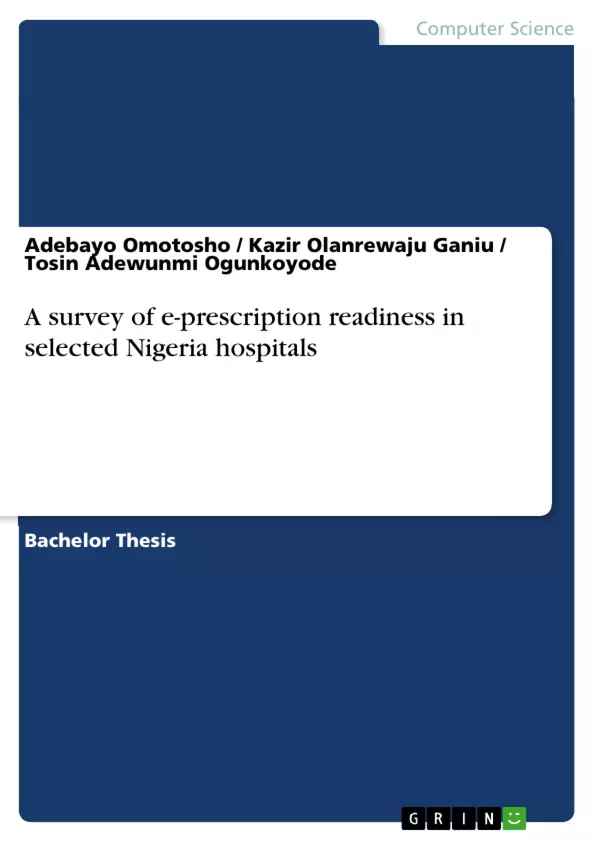Electronic prescribing or e-prescribing (EP) is a computer-based electronic generation and transmission of a prescription. EP systems help to increase patient safety and increases prescribing accuracy, the system also helps to reduce costs through improved legibility. The motivation for e-prescribing is greater safety of drug use and the current unacceptable levels of adverse drug events. The aim of this study is to evaluate the readiness of hospitals in Nigeria to adopt E-Prescription system for patient welfare and improved healthcare service delivery.
This paper presented survey results of electronic prescription readiness in Nigeria hospitals. The survey was conducted in Nigeria hospitals, which includes Lagos State University Teaching Hospital (LASUTH), University of Lagos Teaching Hospital (LUTH), Federal Medical Center (FMC Abeokuta) and The Neuropsychiatric hospital, Aro, Abeokuta. A well-structured questionnaire was also developed and was given out to doctors, pharmacists, pharmacy technicians and assistants present at the time of survey administration. Data analysis was performed using MATLAB and SPSS for analyzing of closed-ended questions, descriptive statistics, chi-square test and correlation co-efficient.
From the result of the analysis, it shows that e-prescription system implementation is economically feasible on the side of an individual but on government side adequate funding for the achievement of EP system does not provide for the health sector to acquire the necessary resource and training skills.
Inhaltsverzeichnis (Table of Contents)
- CHAPTER ONE
- INTRODUCTION
- 1.1 Background of study
- 1.2 Statement of problem
- 1.3 Motivation
- 1.4 Aim
- 1.5 Objectives
- 1.6 Methodology
- 1.7 Significance of study
- 1.8 Scope
Zielsetzung und Themenschwerpunkte (Objectives and Key Themes)
The study aims to assess the readiness of selected hospitals in Nigeria to adopt e-prescription systems. It investigates the current state of technology infrastructure, healthcare professional attitudes, and potential challenges to e-prescription implementation.
- E-prescription readiness in Nigerian hospitals
- Technological infrastructure and its impact on e-prescription adoption
- Attitudes and perceptions of healthcare professionals towards e-prescription systems
- Potential challenges and barriers to e-prescription implementation
- The significance of e-prescription for improving healthcare delivery in Nigeria
Zusammenfassung der Kapitel (Chapter Summaries)
Chapter one provides an introduction to the study, including the background, statement of the problem, motivation, objectives, methodology, significance, and scope. The chapter sets the stage for the research by outlining the rationale for investigating e-prescription readiness in selected Nigerian hospitals.
Schlüsselwörter (Keywords)
The study focuses on the key concepts of e-prescription, hospital readiness, technological infrastructure, healthcare professionals, and challenges to implementation. It examines the potential benefits and challenges associated with adopting e-prescription systems in the Nigerian healthcare context.
Frequently Asked Questions
What is e-prescribing (EP)?
E-prescribing is a computer-based system for the electronic generation and transmission of medical prescriptions, aimed at improving patient safety and accuracy.
What are the main benefits of e-prescription systems?
Key benefits include reduced medication errors due to poor handwriting, improved drug use safety, and cost reduction through increased efficiency.
Are Nigerian hospitals ready for e-prescribing?
The study shows that while implementation is economically feasible for individuals, there is a lack of adequate government funding and training for the broader health sector.
Which hospitals were surveyed in this study?
The survey included LASUTH, LUTH, FMC Abeokuta, and the Neuropsychiatric Hospital in Aro, Abeokuta.
What are the major barriers to EP adoption in Nigeria?
Major barriers include insufficient technological infrastructure, lack of funding for resources, and the need for specialized training for healthcare professionals.
- Quote paper
- Adebayo Omotosho (Author), Kazir Olanrewaju Ganiu (Author), Tosin Adewunmi Ogunkoyode (Author), 2013, A survey of e-prescription readiness in selected Nigeria hospitals, Munich, GRIN Verlag, https://www.hausarbeiten.de/document/231538


